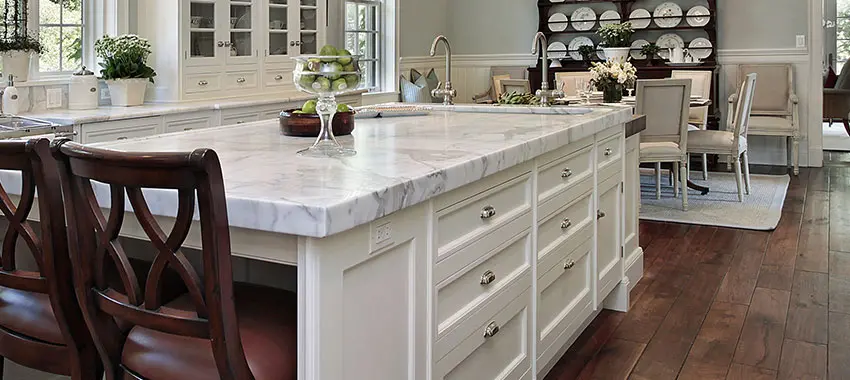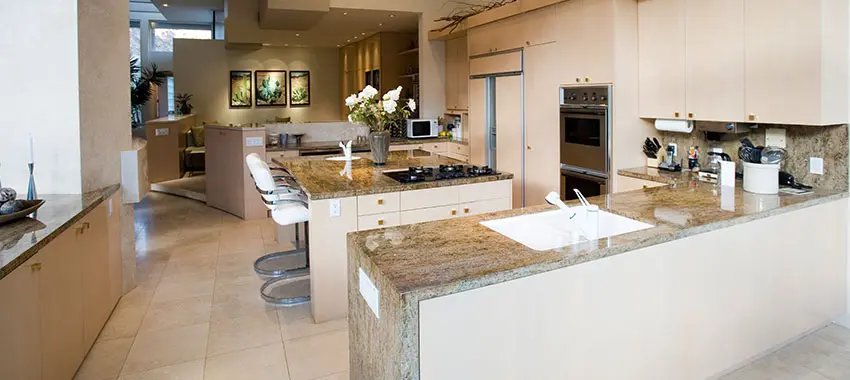Mar
How Do You Ruin Granite Countertops?
While granite is one of the toughest countertop materials on the market, it can still get ruined. How do you ruin granite countertops? There are plenty of ways you can do it. These ways include:
Ignoring spillages
Due to the tough granite look, some homeowners ignore it when spills happen on granite surfaces. This is wrong. While granite is tough, it’s highly porous, so when you let even water sit on the surfaces for a long time, it risks sinking to the deeper layers and causing stains.
To prevent this from happening, you should make it a habit to clean the spills as soon as they happen.
If you were away when the spills happened, and now the countertops are already stained, all is not lost as there are several tricks you can use to remove the stain.
One of the most effective ways to remove the stain is to use a homemade paste out of acetone and baking soda. Let the mixture sit overnight, then wipe it clean and rinse it with water.
To completely remove the stain, you may have to repeat this process 2-3 times, so it’s always wise to reseal the countertop surfaces after the process, as acetone has been shown to strip away the existing sealer.
If you repeat this process and still the stain doesn’t go away, get in touch with a professional to help you remove it.
Placing hot pots directly on the countertops.
Granite is one of the hardest stones on earth, so the hot pots and pans can’t damage it, right? Well, this is wrong.
While the countertop is heat resistant, it’s not heatproof. This means that when you regularly expose it to a lot of heat, it’s bound to get damaged, and you don’t want this, do you?
To protect your countertops, always have trivets and heat pads in place. These will absorb the heat and keep your surfaces safe from heat damage.
Cutting directly on granite
The same way granite is tough and can withstand heat damage for some time is the same way it can withstand knife abuse, but for just some time.
When you regularly chop meat, vegetables, or anything else on the countertops, you create significant scratches on the countertops, which dulls the appearance of the stone. There is also the risk of damaging the knives.
To ensure this doesn’t happen, always have a chopping board in the kitchen and use it whenever you want to cut anything.
Standing on the countertops.
As we have been saying, granite has a tough look, and this encourages homeowners to sit or even stand on the countertops. While you might get away with it at first, there is the risk of cracks on the countertops enlarging and breaking the countertop surfaces when you repeatedly do it.
Sometimes the countertops will crack and break especially when you sit or stand on the edges.
Avoid sitting or standing on the countertops to be on the safe side. If you want to spend time in the kitchen as you are preparing the meals, don’t sit on the countertops. Use a chair.
Instead of standing on the countertops as you reach the top shelf or replace the bulb, stand on a ladder or stool.
The same way you shouldn’t sit or stand on the countertops is the same way you shouldn’t let the children sit or stand there as the present striations will crack under excessive weight.
Using the wrong cleaning products
Every homeowner wants to give their countertops the best look possible, so they are sometimes tempted to clean the surfaces with tough cleaning products.
As much as cleaning products containing ammonia and bleach thoroughly clean the surfaces, they sometimes lead to the granite stone losing its luster, and you are forced to spend a good amount of money polishing the surfaces.
To prevent this, avoid tough cleaning products. Instead, use soap and hot water. To prevent the surfaces from being too dirty, clean them often.
Granite contractors Rockville recommend that you clean the surfaces at the end of each day. This way, the surfaces don’t accumulate too much dirt that you are tempted to use tough cleaning products.



